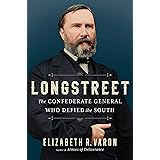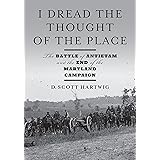
Download the free Kindle app and start reading Kindle books instantly on your smartphone, tablet, or computer - no Kindle device required.
Read instantly on your browser with Kindle for Web.
Using your mobile phone camera - scan the code below and download the Kindle app.

OK
 Audible sample Sample
Audible sample Sample 


Sherman's March Hardcover – April 12, 1980
"What gives this narrative its unusual richness is the author's collation of hundreds of eyewitness accounts...The actions are described in the words, often picturesque and often eloquent, of those who were there, either as participants -- Union soldiers, Confederate soldiers -- in the fighting and destruction or as victims of Sherman's frank vow to 'make Georgia howl.' Mr. Davis intercuts these scenes with closeups of the chief actors in this nightmarish drama, and he also manages to give us a coherent historical account of the whole episode. A powerful illustration of the proposition put forth in Sherman's most famous remark." -- The New Yorker
From the Trade Paperback edition.
- Print length335 pages
- LanguageEnglish
- PublisherRandom House
- Publication dateApril 12, 1980
- ISBN-100394507398
- ISBN-13978-0394507392
Books with Buzz
Discover the latest buzz-worthy books, from mysteries and romance to humor and nonfiction. Explore more
Similar items that may deliver to you quickly
Editorial Reviews
Review
-- Library Journal
From the Trade Paperback edition.
From the Inside Flap
"What gives this narrative its unusual richness is the author's collation of hundreds of eyewitness accounts...The actions are described in the words, often picturesque and often eloquent, of those who were there, either as participants -- Union soldiers, Confederate soldiers -- in the fighting and destruction or as victims of Sherman's frank vow to 'make Georgia
Product details
- Publisher : Random House; 1st edition (April 12, 1980)
- Language : English
- Hardcover : 335 pages
- ISBN-10 : 0394507398
- ISBN-13 : 978-0394507392
- Item Weight : 1 pounds
- Best Sellers Rank: #792,891 in Books (See Top 100 in Books)
- #2,503 in U.S. Civil War History
- Customer Reviews:
About the author

Discover more of the author’s books, see similar authors, read author blogs and more
Customer reviews
Customer Reviews, including Product Star Ratings help customers to learn more about the product and decide whether it is the right product for them.
To calculate the overall star rating and percentage breakdown by star, we don’t use a simple average. Instead, our system considers things like how recent a review is and if the reviewer bought the item on Amazon. It also analyzed reviews to verify trustworthiness.
Learn more how customers reviews work on AmazonReviews with images
-
Top reviews
Top reviews from the United States
There was a problem filtering reviews right now. Please try again later.
If you are looking for detailed accounting of troop movements, military communiques this not it. There sre other books for that.
Burke has done a service to the above books and taken to heart the legend of Sherman and his march to the sea. Was he a ruthless butcher l, a bigot or some other sort.
Burke gives you personal accounts of southerners caught in his wake, slaves who plantations abandoned followed his 10 mile long as it winded its way through Georgia and the Carolina's. From accounts of union soldiers, bummers, and foragers alike.
An engaging read. Well written.
As one can tell by the reviews, many come to this topic with their minds made up, either in support of Sherman or with him as the bete noire of the Southern cause.
The march was a devastating blow to the south, and whether one finds it justifiable or reprehensible, rational arguments can be made to support either side. On one side there is the devastation visited on women and children, old and young and on the other side, that the march shortened the war, and was in this sense justified to shorten the nation's suffering.
Much like the horrific effects of dropping the atomic bombs on Japan at the end of WWII, the march must be taken in the context of its time and circumstances. I doubt there will ever be a consensus agreement on either the march, or the use of atomic bombs on civilian populations.
The personal perspectives of both common people, and the powerful (Grant, Lincoln, Stanton and several of Sherman's opponents and generals) is a strong point of the narrative, and it gives a good perspective that the leaders in the north were apprehensive and unsure of the armies ability to make this march, while the Western army was never seriously threatened by confederate forces after Atlanta.
The treatment of blacks by both the North and South is abhorrent, and well documented throughout. The most poignant example is the difference in rape, and it's consequences, depending solely on the color of the victim's skin.While racism is unfortunately still thriving in our nation, one can not but help regard the extreme prejudice so prevalent at the end of the civil war with horror.
All in all, I found this a good read, and recommend it to anyone looking for a well researched perspective on a troubling period of our history.
Top reviews from other countries
Reading the book makes it clear why it was that the Civil War ended as it did, rather than trailing away into a years of guerrilla warfare. Sherman was one of the very few high ranking officers, on either side, who understood the concept of total war, and was prepared, and in a position to, employ his theories.
A fascinating book, well written, and easy to read.











